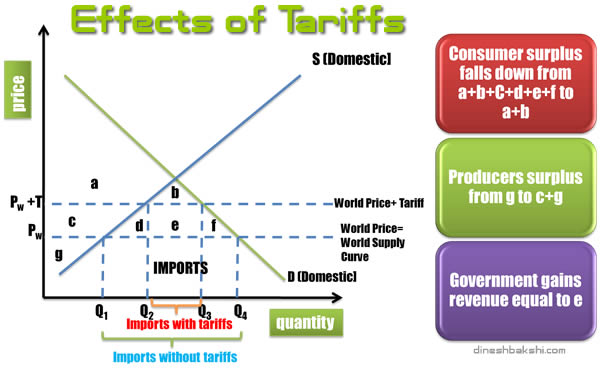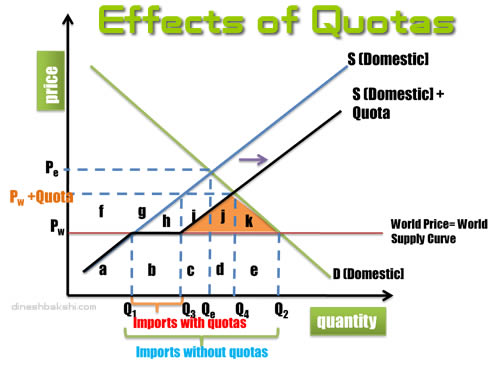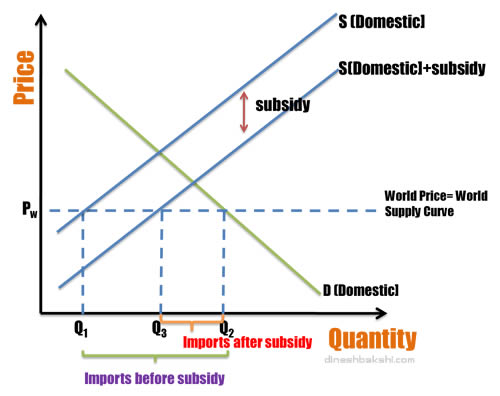Protectionism
Policy of protecting domestic industries against foreign competition by means of tariffs, subsidies, import quotas, or other handicaps placed on imports. The chief protectionist measures, government-levied tariffs, raise the price of imported articles, making them less attractive to consumers than cheaper domestic products. Import quotas, which limit the quantities of goods that can be imported, are another protectionist device.
Methods of Protectionism
Tariffs
A tariff is a tax on foreign goods upon importation. Tariff rates vary according to the type of goods imported. Import tariffs will increase the cost to importers, and increase the price of imported goods in the local markets, thus lowering the quantity of goods imported.

Impact of Tariffs
- Tariffs lead to higher prices for imports and thus Imports fall
- Domestic consumers have to pay higher prices and buy less.
- Domestic producers gain, as they get higher prices and sell larger quantities. As we can see in the diagram domestic production increases from 0Q1 to 0Q2. Moreover their revenue increases from PwQ1 to Pw+TQ2
- Higher domestic production leads to increased domestic employment.
- Government now gains from tariff revenues, which can be represented by ‘e’ in the diagram
- Tariffs are regressive in nature and thus worsen income distribution.
- Exporting countries lose due to fall in exports.
Quotas
An import quota is a type of protectionist that sets a physical limit on the quantity of a good that can be imported into a country in a given period of time. This leads to a reduction in the quantity imported and therefore increases the market price of imported goods. Quotas, like other trade restrictions, are used to benefit the producers of a good in a domestic economy at the expense of all consumers of the good in that economy.

Effects of Quotas
- Domestic production increases from 0Q1 to 0Q1+Q3Q4.
- Domestic consumption fall from 0Q2 to 0Q4
- Imports fall from Q1Q2 to Q1Q3
- Consumers end up paying more. Before quota was imposed they were paying Pw, but now they are paying Pw+Quota
- Domestic producers gain as they sell more at higher prices (Pw+Quota)
- Domestic employment increases as domestic production rises.
- Government gets quota revenues
- Domestic society is worse off due to decrease in consumption and production by less efficient producers
- Exporting countries lose revenue
- Quotas result in global misallocation of resources as goods are being produced by inefficient producers.
- J and K represents the dead weight loss of welfare to the society, as J represents production by inefficient producers and K represents the loss of consumer surplus.
Subsidies
Government subsidies (in the form of lump-sum payments or cheap loans) are sometimes given to local firms that cannot compete well against foreign imports. These subsidies are purported to "protect" local jobs, and to help local firms adjust to the world markets.
Effects of Subsidies
- Consumption of the good is not affected. Consumption remains at Q3.
- Taxpayers lose as the tax revenue collected is being used for subsidies
- Domestic producers gain as the production increases from 0Q1 to 0Q3.
- Employment increases as more is being produced domestically.
- Exporting countries are worse off
- Global misallocation of resources as inefficient producers are now producing goods.
Administrative Barriers
Countries are sometimes accused of using their various administrative rules (eg. regarding food safety, environmental standards, electrical safety, etc.) as a way to introduce barriers to imports.
Embargo
An embargo is the prohibition of commerce and trade with a certain country, in order to isolate it and to put its government into a difficult internal situation, given that the effects of the embargo are often able to make its economy suffer from the initiative.
Anti-dumping legislation
Supporters of anti-dumping laws argue that they prevent "dumping" of cheaper foreign goods that would cause local firms to close down. However, in practice, anti-dumping laws are usually used to impose trade tariffs on foreign exporters.
Watch a Video





